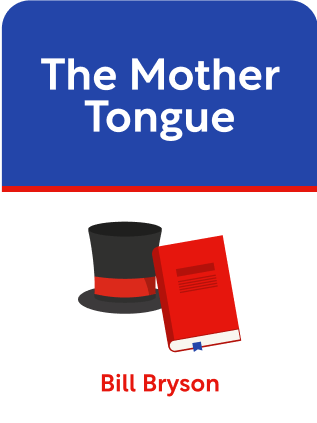

This article is an excerpt from the Shortform book guide to "The Mother Tongue" by Bill Bryson. Shortform has the world's best summaries and analyses of books you should be reading.
Like this article? Sign up for a free trial here .
Where did English come from? What are the origins of the English language?
English is a Germanic language whose origins date back to the mid-5th century CE. The story of English began when the Germanic peoples known as the Angles and Saxons, hailing from what is now Northern Germany, began migrating to and conquering the Roman province of Britannia.
Keep reading to learn about the origins of the English language.
Tracing the Origins of the English Language
All human societies feature one crucial building block of social organization—language. The spoken and written word is what binds individuals together and helps us form stable communities. In modern history, the English language has come to occupy a dominant position.
At first glance, it might seem unlikely that the native tongue of a people occupying just one part of an island off the coast of northwestern Europe would become the international language of business and diplomacy. To understand how this came to be, we need to understand the history of English and the processes by which it evolved into the language we speak and write today. What are the origins of English? What are the characteristics of the language that made it easier for people all over the globe to adopt and spread it? What quirks and features of English make it unique? And what is the future of the language?
But before we can explore the origins of the English language, we need to have some understanding of the processes by which all languages develop.
The Origins of Human Language
Human language probably began with prehistoric Cro-Magnon man and became more complex with the arrival of Homo sapiens tens of thousands of years ago. The bigger brains of Homo sapiens likely helped the development and sophistication of language, which, in turn, provided an evolutionary advantage for Homo sapiens over other hominids because it made communication and social cohesion a lot easier. The precise mechanisms by which humans first created language are unknown, though some linguists think that onomatopoeia (words like boom or clap that phonetically mimic the sounds they describe) may have played a role in catalyzing the process, as humans would have sought a way to communicate the natural sounds they heard.
Some of the most interesting and insightful work on language origins has been done through the study of how children first learn and acquire it. Noam Chomsky observed that even newborn infants seem to possess some innate understanding of language and a basic template for how words are supposed to be ordered and sequenced. For example, before they turn two, most children seem to grasp the difference between stative (“I like bananas”) and non-stative verbs (“I am liking bananas”) and rarely ever make this grammatical mistake again.
The Indo-European Language Family
Linguists have discovered that many of the languages spoken in Europe and Asia today, as well as many languages of the ancient world, belong to one great Indo-European family of languages. There are even linkages between languages separated by vast reaches of space, like the Basque spoken in some parts of Spain and certain Native American languages.
Linguists have yet to discover a single master Indo-European parent language or identify the precise geographical area where it may have originated. They believe that languages became differentiated and unique once the original tribal group began to spread out across the Eurasian landmass between 2,500 and 3,500 BCE, giving rise to languages across an area stretching from the Scottish Highlands to Sri Lanka.
English is within the Germanic family of languages (the West Germanic branch, to be precise), along with German and Dutch. English, although not a Romance language, owes much of its origins to Latin and the Roman Empire.
The Anglo-Saxon Origins of English
The story of English began with the Anglo-Saxon conquest of the Roman province of Britannia in the mid-5th century CE.
These Angles and Saxons brought their North Sea Germanic dialects to their new home. The linguistic linkages between English and the dialects spoken in Northern Germany can still be detected today. They even gave their name to the new country—Angle-land, or England.
Different invading tribes settled in different regions of what is now England, lending their own unique linguistic stamp to different regions of the country. The echoes of this historical process of localized linguistic development can even be seen in the United States today, as different regions of North America were, in their turn, settled by people from different regions of the British Isles.
(Shortform note: Albion’s Seed: Four British Folkways in North America by David Hackett Fischer explores this latter idea in greater detail, showing how migration to the Americas from different parts of Great Britain influenced the linguistic, social, economic, and political trajectories of different regions of what ultimately became the United States.)
These illiterate, war-like invaders certainly formed a stark contrast with the law-abiding, literate, and cultured Romano-British elite, who enjoyed a standard of living that would be unseen in the British Isles for nearly a millennium. Truly, the Dark Ages had arrived.
These Angles and Saxons brought their Germanic language to their new home, where it morphed over time into the language we now call Old English. Some of our most fundamental words today come from Old English, particularly words related to family—man, wife, child, brother, and sister, to name a few. Old English was a rich literary language as well, leaving behind a trove of letters, charters, religious works, and legal texts. Old English works like Beowulf and Caedmon’s Hymn are the starting points of English literature.
From the 8th to the 10th centuries CE, the British Isles were invaded and settled by the Vikings of Scandinavia. The Viking immigrants and their Norse language further enriched the Old English vocabulary, adding important words like husband, sky, and leg. Old English also absorbed syntax and grammatical structure from Old Norse, a testament to the language’s fluidity, even at this early stage in its development.
In 1066, the Norman king William I conquered England and displaced the reigning Anglo-Saxon ruling elite. Norman French came to exert its own powerful influence on English vocabulary and structure—no fewer than 10,000 words can be traced to the time of the Norman Conquest.
Historical Evolution
Throughout the later Middle Ages, English evolved organically and developed many of its more recognizable features. One such feature was uninflected verbs with stable consonants (in other words, they are mostly the same regardless of gender, tense, case, and mood). Another was the simplification of noun endings to denote plurals (almost all English nouns are today pluralized with the addition of a simple s at the end).
In England, the speech patterns of the capital city of London came to establish the standard for how the language was spoken in the rest of the country, although this was a long and uneven historical process that didn’t happen all at once or with the same speed everywhere. Vestigial features of older forms of the language remain in place to this day, with archaic pronouns like thee and thou still spoken in parts of Yorkshire.
Perhaps the most famous change in pronunciation was the Great Vowel Shift running roughly from 1400-1600 CE, during which English speakers began pushing vowels closer to the front of their mouths. The word life, for example, was pronounced lafe in Shakespeare’s time, with the vowel lodged further back in the throat.
At this time, English began to be regarded for its potential as a language of literature. No writer took greater advantage of the incredible flexibility and richness of the English language than Shakespeare. The Bard of Avon alone added some 2,000 words to the language, such as mimic, bedroom, lackluster, hobnob. He also introduced a host of new phrases we still use today, like “one fell swoop” and “in my mind’s eye.” Shakespeare greatly elevated and exalted the English language.
For much of the history of the language, however, words defied standard spelling, with even Shakespeare offering a bewildering array of different and inconsistent spellings for the same words throughout his works. The first steps toward standardization only began with the invention of the printing press in the 15th century and the gradual spread of written works (and thus, literacy) throughout England.
By 1640, there were over 20,000 titles available in English, more than there had ever been. As printed works produced by London printers began to spread across the country, local London spelling conventions gradually began to supplant local variations. What this also meant was that old spellings became fixed just as many word pronunciations were shifting because of the Great Vowel Shift. Our inheritance is a written language with many words spelled the way they were pronounced 400 years ago. As a result, English spellings often bedevil non-native speakers, as well as those who’ve spoken the language their whole lives. Pronunciation and spelling are frequently divergent. To take just one example, the sh sound can be spelled sh as in mash; ti as in ration; or ss as in session. The troublesome orthography (the set of conventions for writing) of English can be seen in words like debt, know, knead, and colonel, with their silent letters, as well as their hidden, but pronounced letters.

———End of Preview———
Like what you just read? Read the rest of the world's best book summary and analysis of Bill Bryson's "The Mother Tongue" at Shortform .
Here's what you'll find in our full The Mother Tongue summary :
- How English became a global language
- How the invention of the printing press led to standardization of written English
- Why English dictionaries are the most comprehensive found in any language






